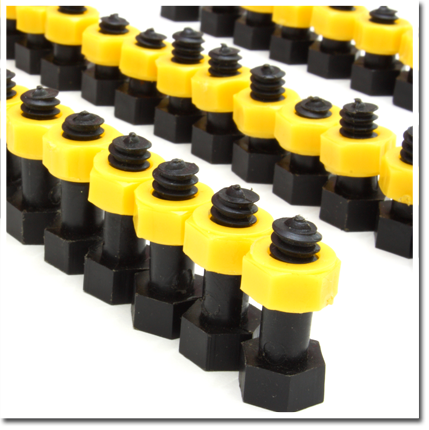
Nylon Hardware in the Fastener World
 Nylon is a synthetic thermoplastic polymer first introduced back in the 1930s. Since then, it has become a highly popular material for an astonishing array of products and applications, including as a polymer for producing fasteners used throughout the electronics industry. Nylon is especially popular for electronics because of its high insulating value and corrosion resistance. Nylon is lighter, stronger, and more wear-resistant than the next most popular electronic fastener material, aluminum.
Nylon is a synthetic thermoplastic polymer first introduced back in the 1930s. Since then, it has become a highly popular material for an astonishing array of products and applications, including as a polymer for producing fasteners used throughout the electronics industry. Nylon is especially popular for electronics because of its high insulating value and corrosion resistance. Nylon is lighter, stronger, and more wear-resistant than the next most popular electronic fastener material, aluminum.
The main advantages of nylon are the resistance it has to vibration, abrasion, chemicals, rust, and corrosion. Additionally, nylon fasteners are lightweight, have limited torque and electrical properties. Fire resistance is one of the most attractive features of nylon as a fastener material – it melts instead of burning. Nylon fasteners can be used with virtually any material, such as other plastics, metal, rubber, wood, and particle board.
The unsurpassed versatility of nylon as a fastener material can be seen in the wide range of fastener types for which it is used, including nuts and bolts, screws, washers, spacers, bushings, panel fasteners, circuit board hardware, hose clamps, wire management clips, and cable ties. Nylon fasteners are used for both sub-system and system or component assembly. For example, nylon circuit board hardware provides spacing, support, and locking capabilities for attaching circuit board components to the board. Their flexibility and ease-of-use make them ideal for systems with interchangeable components – many styles of fasteners feature a locking mechanism that simply needs to be squeezed to enable it to be removed and replaced. Threaded nylon fasteners provide a more permanent attachment for applications in which components are not often removed.
Perhaps the most popular and common nylon fastener in the world is the cable tie, which comes in an almost unlimited variety of lengths, widths, and colors. The width of the cable determines the tensile strength while the length decides the side of the bundling diameter. The availability of many standard and custom colors make them particularly popular as wire and cable management components – they can act as visual aids for quickly identifying certain types and groupings of cables and wires. You’ll find nylon cable ties used throughout the electrical, computer, and automotive, to name just a few.
To learn more about nylon fasteners and their many applications, contact the nylon fastener experts here at Electronic Fasteners.

